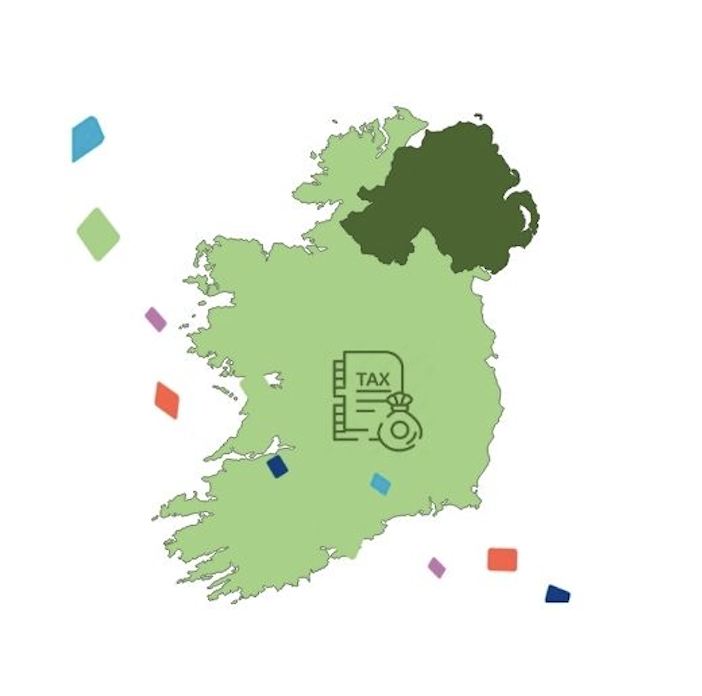Gift Card Taxation In Ireland: A Business Guide


by Signe Hegart
October 26, 2023
Rewarding employees or customers with gift cards is a popular way for businesses to show appreciation and boost engagement. However, it’s important to understand the tax implications of giving gift cards, particularly in Ireland. In this blog post, we will provide a comprehensive guide to gift card taxation in Ireland, helping businesses navigate the complexities and ensure compliance.
Jump to section
Gift Card Taxation In Ireland
Starting on January 1, 2022, it’s now possible to provide your employees with a maximum of two non-taxable small benefits per year. This change stems from the revisions outlined in the budget announcement made on September 27, 2022. It’s important to note that these benefits must not be provided in the form of cash, and the combined value of both benefits should not exceed €1,000.
If you happen to offer more than two benefits within a single year, only the initial two can qualify for tax-free status. It’s essential to be aware that any remaining allowance amounts cannot be carried forward to the following year.
The tax-free vouchers or benefits are exclusively intended for the purchase of goods or services and cannot be exchanged for cash.
Source: Revenue
What are gift card taxation laws? ⚖️
Gift card taxation laws refer to the regulations and guidelines set by the government regarding the tax treatment of gift cards. These laws determine how gift cards are taxed and whether recipients need to pay taxes on the value of the gift card.
In Ireland, gift card taxation is primarily governed by the Revenue Commissioners, the country’s tax authority. The taxation of gift cards depends on various factors, including the type of gift card, the value of the gift card, and the purpose of the gift card.
Generally, when an employer provides an employee with a gift card, it is considered a benefit in kind. This means that the value of the gift card is treated as additional income for the employee and is subject to income tax and social security contributions.
However, there are some exemptions when it comes to gift card taxation. If the gift card is provided as part of an employee reward or incentive program, it may be exempt from income tax and social security contributions. This exemption applies if the gift card is given as a reward for exceptional performance or if it is provided under a small benefit exemption scheme.
Read also: Understanding Gift Card Taxation in Spain: A Comprehensive Guide
Gift Card Taxation In Ireland for companies with international employees
Gift card taxation in Ireland for companies with international employees can be complex, as it involves considerations related to both Irish tax regulations and potential tax obligations in the employees’ home countries. Here are some important points to keep in mind:
Irish Taxation
In Ireland, gift cards provided to employees are considered taxable benefits and are subject to Pay As You Earn (PAYE) and Pay-Related Social Insurance (PRSI). Employers must account for these taxes on the value of the gift cards.
VAT Implications
Value Added Tax (VAT) may also apply to the purchase of gift cards in Ireland. Depending on the specific type of gift card and its intended use, different VAT rates may be applicable.
Record-Keeping
Maintain accurate records of gift cards provided to international employees, including the value of the cards, recipients’ names, and any applicable tax deductions. Proper record-keeping is essential for tax reporting and compliance.
International Tax Considerations
Consider the tax implications for international employees in their home countries. Gift card benefits provided by an Irish employer may be subject to tax in the employees’ home countries, depending on the tax laws and regulations in those jurisdictions.
Double Taxation Agreements (DTAs)
Some countries have Double Taxation Agreements (DTAs) with Ireland to prevent double taxation on income. These agreements may specify how gift card benefits are treated for tax purposes and which country has the primary right to tax the benefits. Check the relevant DTA for guidance.
Tax Withholding
In some cases, employers may need to withhold taxes for international employees based on the laws and tax treaties between Ireland and the employee’s home country.
Professional Advice
Given the complexity of international tax matters, it’s advisable to seek professional advice from experts with knowledge of Irish tax law and international tax treaties. Tax advisors and legal experts can help ensure compliance and minimize the risk of tax issues.
Read also: Gift Card Taxation In UK: Understanding the Rules and Regulations
Why are gift card taxation laws important?
Gift card taxation laws serve several crucial purposes:
- Economic Revenue: These laws play a pivotal role in generating substantial revenue for businesses. Taxation on gift card sales becomes a reliable source of income for governments, aiding in the financing of public services and infrastructure projects.
- Consumer Safeguards: Taxation regulations act as safeguards for consumers, ensuring businesses abstain from unfair practices concerning gift cards. These legal provisions oblige businesses to uphold the value of gift cards, even if they remain inactive for extended periods.
- Enhanced Transparency: Gift card taxation laws mandate businesses to be transparent about the terms and conditions associated with gift cards. This includes divulging information regarding fees, expiration dates, and any usage constraints. Such transparency guarantees that consumers are well-informed before they purchase gift cards.
- Equity: These laws are instrumental in guaranteeing that the balances on gift cards do not deplete too rapidly and that fees do not unduly erode their value. This fosters fairness, particularly for consumers who might not immediately redeem their gift cards.
- Management of Unclaimed Funds: Some gift cards are never redeemed, leading to the accumulation of unclaimed property. Gift card taxation laws provide a framework for regulating the handling of these unclaimed funds, a matter of significance for both businesses and state governments.
Related: Gift And Gift Card Taxation in Germany Simplified
Understanding the Gift Card Taxation In Ireland
Employers in Ireland can provide gift cards to their employees as a form of remuneration or employee incentive. Understanding the taxation implications of gift cards for employers in Ireland is important to ensure compliance with tax laws and to effectively manage employee rewards. Here are some key points to consider:
- Taxable Benefits: Gift cards provided by employers to employees are considered taxable benefits and are subject to Irish tax regulations. These benefits are generally classified as “Benefit-In-Kind” (BIK).
- PAYE and PRSI: Employers are required to account for Pay As You Earn (PAYE) and Pay-Related Social Insurance (PRSI) on the value of the gift card provided to employees. The value of the gift card is treated as additional income for the employee.
- Thresholds and Exemptions: There are certain exemptions and thresholds that may apply to gift cards. For example, small benefits (valued up to a certain limit) provided by employers to employees may be exempt from taxation. The specific threshold and conditions can change, so it’s important to consult the latest guidance from the Irish Revenue.
- Reporting and Documentation: Employers must keep records of the gift cards provided to employees, including the value, recipient’s name, and the reason for providing the gift card. Proper documentation is essential for compliance and tax reporting.
- Income Tax Return: Employers are typically required to include the value of gift cards provided to employees on the employees’ annual income tax returns.
- VAT Reclaim: Employers can reclaim Value Added Tax (VAT) on the purchase of gift cards used for employee rewards or incentives. It’s important to keep records of VAT expenses and follow the appropriate procedures for VAT reclamation.
It’s crucial for employers to stay updated on the latest tax laws and regulations related to gift cards in Ireland, as they can change over time. Consulting with a tax advisor or the Irish Revenue can provide specific guidance based on your particular situation and the latest tax rules.
Read also: Understanding Gift and Gift Card Taxation In France: A Quick Overview
Types of gift cards in Ireland ????
In Ireland, there are various types of gift cards available to consumers, each designed for different purposes and preferences. Here are some common types of gift cards in Ireland:

Multi-retailer gift cards, also known as multi-store or shopping center gift cards, can be used at a variety of different participating stores, restaurants, or businesses. These cards offer a broader selection of choices and are often issued by third-party companies.

Entertainment Gift Cards
Entertainment gift cards may be used to access entertainment services, such as streaming subscriptions, cinema tickets, or events. They provide access to a wide range of entertainment options.

These gift cards offer experiences rather than physical products. Recipients can choose from activities like spa days, adventure outings, cooking classes, or other experiences based on the gift card’s theme.

These are essentially prepaid debit cards with a fixed monetary value. They can be used for purchases anywhere that accepts debit or credit cards, both online and in physical stores.

Some companies and websites allow customers to create personalized gift cards with custom designs, images, and messages. These are often used for special occasions like birthdays or weddings.

These cards enable the recipient to make a donation to a chosen charity or cause. The value of the gift card is donated to the specified organization.

Corporate or Employee Gift Cards
Employers often use gift cards as a form of employee recognition or rewards. These may be tailored for use at specific retailers or as flexible options like prepaid debit cards.

Send yourself a gift card
Navigating Gift Card Taxation In Ireland
Navigating gift card taxation in Ireland involves understanding and complying with the tax regulations and consumer protection laws related to gift cards. Here are some steps to help you navigate gift card taxation in Ireland:
Understand VAT Implications
Be aware of the Value Added Tax (VAT) implications. In Ireland, gift cards are typically subject to VAT, and the specific rate may vary based on the type of goods or services the gift card can be used for.
Business to Business Transactions
If you are a business purchasing gift cards for distribution to employees, customers, or clients, understand the conditions and documentation requirements for reclaiming VAT on these purchases.
Comply with Expiry and Inactivity Regulations
Ensure that your gift card policies comply with Irish regulations, which generally prohibit expiry dates on gift cards for at least five years from the date of issue. Additionally, avoid imposing inactivity fees on gift cards.
Consumer Rights and Disclosure
Familiarize yourself with consumer rights related to gift cards. Inform your customers about these rights, including their entitlement to a replacement card in the case of loss or theft, provided they can prove the original purchase.
Record Keeping
Maintain accurate records of gift card sales, redemptions, and any unclaimed gift card balances. Proper record-keeping is essential for tax reporting and compliance.
Read also: Are Gift Cards for Employees Taxable? US Expert Insights
Employers responsibilities in Ireland when providing gift cards for employees
When providing gift cards for employees in Ireland, employers have certain responsibilities to ensure compliance with tax and employment regulations. Here are the key responsibilities of employers in Ireland when offering gift cards to employees:

Taxation and Reporting
Ensure that you are compliant with tax regulations. Gift cards provided to employees are considered taxable benefits, and the value of the gift cards must be reported to the Irish Revenue. Employers are required to account for Pay As You Earn (PAYE) and Pay-Related Social Insurance (PRSI) on the value of the gift cards.

Thresholds and Exemptions
Familiarize yourself with any thresholds and exemptions that may apply. For example, there are exemptions for small benefits (up to a certain limit) provided to employees. The specific thresholds and conditions may change over time, so consult the latest guidance from the Irish Revenue.

Record Keeping
Maintain accurate records of all gift cards provided to employees, including details such as the value of the gift cards, the names of recipients, and the reason for providing the gift cards. Proper record-keeping is essential for tax reporting and compliance.

Reporting to Employees
Communicate with employees about the tax implications of receiving gift cards. Make them aware that the value of the gift cards will be considered part of their taxable income and will be reported to the Irish Revenue for taxation purposes.

Correct Payroll Reporting
Ensure that the value of the gift cards is included in employees’ payroll reporting, and that the correct PAYE and PRSI are deducted and remitted to the appropriate authorities.

VAT Reclamation
If applicable, reclaim Value Added Tax (VAT) on the purchase of gift cards used for employee rewards or incentives. Keep records of VAT expenses and follow the appropriate procedures for VAT reclamation.
Let’s have a chat
Case studies to illustrate how Gift Card Taxation In Ireland works in different scenarios
Case Study 1: Retailer-Specific Gift Cards
Scenario: Sarah’s Coffee Shop, a small business in Dublin, decides to offer gift cards to customers for the holiday season. They want to understand the taxation implications.
Gift Card Type: Retailer-specific gift cards for use at Sarah’s Coffee Shop only.
Taxation Implications: Sarah’s Coffee Shop issues gift cards and does not charge VAT at the point of sale. However, when customers redeem the gift cards, the value of the purchased goods or services is subject to the standard VAT rate (e.g., 23%) at the time of redemption. The coffee shop must report and remit the collected VAT to the Irish Revenue.
Case Study 2: Multi-Retailer Gift Cards
Scenario: A shopping mall in Cork offers multi-retailer gift cards that can be used at various stores within the mall. They want to understand the tax implications.
Gift Card Type: Multi-retailer gift cards for use at multiple stores in the shopping mall.
Taxation Implications: The shopping mall sells multi-retailer gift cards and charges VAT at the standard rate (e.g., 23%) on the purchase price. The VAT collected on the sale of these gift cards must be reported and remitted to the Irish Revenue.
Case Study 3: International Employee Rewards
Scenario: A tech company based in Dublin wants to provide international employees with gift cards as a recognition reward. The company has employees in several countries and wants to understand the tax implications.
Gift Card Type: Prepaid debit gift cards for employees.
Taxation Implications: The company provides prepaid debit gift cards to employees as a reward for exceptional performance. In Ireland, the value of the gift cards is considered a taxable benefit, and the company must account for PAYE and PRSI. Additionally, the tax implications for international employees may vary based on the tax laws and regulations in their respective home countries. The company must consider potential tax obligations in the employees’ home countries and comply with any relevant tax treaties or agreements.
Case Study 4: Corporate Gifting
Scenario: A multinational corporation with offices in Ireland provides gift cards to its employees for the holidays. The company wants to understand how to handle tax implications for both employees and the business.
Gift Card Type: Customizable gift cards for employees.
Taxation Implications: The company offers customizable gift cards to employees, allowing them to choose their preferred retailer or experience. In Ireland, the value of these gift cards is considered a taxable benefit, and the company must account for PAYE and PRSI on the value of the gift cards. Depending on the specific corporate policies and tax regulations in each employee’s home country, there may be additional tax implications or reporting requirements, and the company should consult with tax experts to ensure compliance.
These case studies illustrate how gift card taxation in Ireland can vary based on the type of gift card, its use, and the specific circumstances. Businesses must be aware of the VAT and income tax implications, as well as any international tax considerations when providing gift cards to employees and customers. Consulting with tax professionals and staying informed about relevant regulations is essential to navigate these scenarios effectively.
Tips for Gift Card Taxation In Ireland
- Understand the VAT Rules: Familiarize yourself with the Value Added Tax (VAT) regulations in Ireland. Different types of gift cards may have varying VAT rates, so know the applicable rates for your specific gift cards.
- Compliance is Key: Ensure compliance with Irish tax laws and regulations. Be aware of your responsibilities for reporting and remitting VAT and any income tax related to gift card sales and employee benefits.
- Record-Keeping: Maintain accurate records of gift card sales, redemptions, and any unclaimed balances. Proper record-keeping is essential for tax reporting and compliance.
- Employee Rewards: If providing gift cards as employee rewards or incentives, be aware that the value of the gift cards is considered a taxable benefit and must be accounted for in payroll reporting.
Conclusion
In conclusion, gift card taxation in Ireland can be complex and varies depending on the type of gift card and its use. It is important for businesses to understand the VAT and income tax implications when providing gift cards to employees and customers. Additionally, international tax considerations should be taken into account for employees in different countries. Consulting with tax professionals and staying informed about relevant regulations is crucial to navigate these scenarios effectively. By doing so, companies can ensure compliance and avoid any potential issues with tax authorities.
It’s important to emphasize that individuals and businesses should always seek professional assistance and guidance when dealing with Gift Card Taxation in Ireland. The complexities and nuances of tax regulations can have a significant impact on financial decisions, so consulting with tax professionals or legal experts is strongly recommended to ensure compliance and navigate any potential challenges effectively.



Let’s have a chat
FAQ
Yes, depending on the specific corporate policies and tax regulations in each employee’s home country, there may be additional tax implications or reporting requirements. It is important for companies to consult with tax experts to ensure compliance.
In Ireland, gift cards may be subject to Value Added Tax (VAT) and income tax. Employers may also need to account for PAYE and PRSI on the value of the gift cards provided to employees.
The taxability of gift cards in Ireland depends on the type of gift card and its use. Some gift cards may be considered taxable benefits, while others may not be subject to taxation.
Yes, when in doubt, it is always recommended to seek advice from a tax advisor or HM Revenue and Customs (HMRC). Tax regulations can change, so it’s essential to stay informed and consult with experts who can provide accurate and up-to-date information.